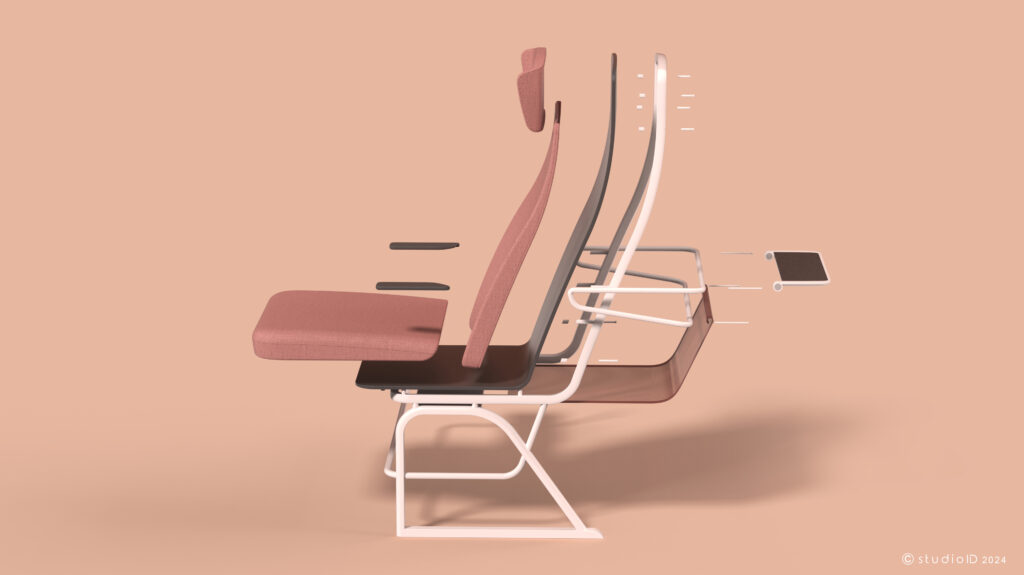Loop Chair Concept from Studio ID Champions Circular Design
Share

Daniel Clucas and Isabella Pour, who co-founded design agency Studio ID Design in December 2023, are the brains behind a new aircraft seating concept dubbed the “Loop Chair,” which is based on the philosophy of circular design.
Although Clucas worked with Acumen Design Associates for 16 years on exciting projects including JetBlue’s Mint and Studio offerings, Recaro’s first business-class seat and the ACCESS expanding disabled lavatory, he said he “wanted to focus exclusively on sustainability in the industry to make sure everything [he] was doing was pushing that needle forwards.”
“The system consists of a basic structural frame that stays on the aircraft for successive refits.”
So began conversations with his business partner Isabella, who is an Associate Environmentalist certified by the Institute of Environmental Management Assessment (IEMA), the global professional body for environmental and sustainable businesses, about how things could be done differently.
The patent-pending Loop Chair is the result of their brainstorming, and with it comes a new business model for airlines and seat manufacturers. Clucas explained, “The modular system consists of a basic structural frame that stays on the aircraft for successive refits. It features mechanical fastenings for all the other parts of the seat, from the cushions to the fold-down tables to the literature pockets.”

This means that rather than airlines ripping out the entire aircraft seat every five to ten years, which then ends up in landfill because it is chemically bonded together as well as potentially being made up of difficult to recycle composite materials, each individual module can be easily detached and then repaired, upgraded or replaced with something totally different.
The Loop Chair system has benefits for both the airline and the environment. “The airlines can do much quicker and more frequent repairs and upgrades if they don’t have to wait until the end of the lifecycle of the entire seat before they can get something new. Maintenance-wise, any replacements can simply be completed on-wing, drastically reducing aircraft downtime and ensuring that the airlines’ fleet stays more cohesive, rather than some cabins featuring old products and some new while traditional, time-intensive retrofits take place.”
“Along with being up there with the lightest economy seats, due to the simplicity of the design, the modularity takes it one step further from an environmental impact perspective”
Keeping all the different parts of the seat separate also means designers and manufacturers can more easily make use of monomaterials, making them far easier to reuse or recycle. For example, Studio ID Design’s concept seat features a small table, a simple 3D knitted literature pocket and 100% recycled wool dress covers, with a frame made from recycled aluminium.
As well as taking into account the seat’s longevity and how it is dealt with at “end of life,” the Loop Chair has been designed to be lightweight. “There are no unnecessary parts or cladding,” Clucas noted. “Look at the armrest – there’s no big vacuum form around it. Along with being up there with the lightest economy seats, due to the simplicity of the design, the modularity takes it one step further from an environmental impact perspective.”

Clucas envisions a future where the airline owns the structural frame, and “all the other parts are essentially leased and hired from from the manufacturer, so they go back after a certain amount of time. The manufacturer then knows what they’re made of and how to recycle or repair them, or even re-upholster them to sell to a different airline. It keeps materials in their highest value state, which is key to their circularity.”
Although different suppliers could make different parts of the chair, Clucas acknowledges this presents some challenges in terms of certification. “Obviously every time you swap a piece out, it will affect the centre of gravity of the chair, so it’s easier to keep everything in-house because then the seat manufacturer is always responsible for the testing.” However, he said if airlines want something in particular from one company, they could always get an independent company to do the certification. “It’s a bit more tricky logistically, but it’s not insurmountable.”
“The patent covers the modular system, so it could definitely accommodate … something more luxurious.”
In terms of potential customers, Clucas foresees the seat being suited to regional aircraft, particularly new hybrid or electric models where sustainable design is already in the aircraft’s DNA. Due to its flexibility, he also thinks the system would work well for a long-haul economy-class product or even a regional business-class seat. “The patent covers the modular system, so it could definitely accommodate a center console, bigger headrests, bigger screens and bigger tables for something more luxurious.”
The next step for Studio ID Design is to take the concept to airlines and manufacturers and gauge interest in the product. Clucas and Pour already have discussions lined up, and will also be at the Aircraft Interiors Expo in Hamburg to speak about the Loop Chair in more depth.
Clucas will also be representing the Green Cabin Alliance at the show, and moderating a panel session titled “Sustainable and Cost-Effective Strategies” at the Passenger Experience Conference on May 27.


